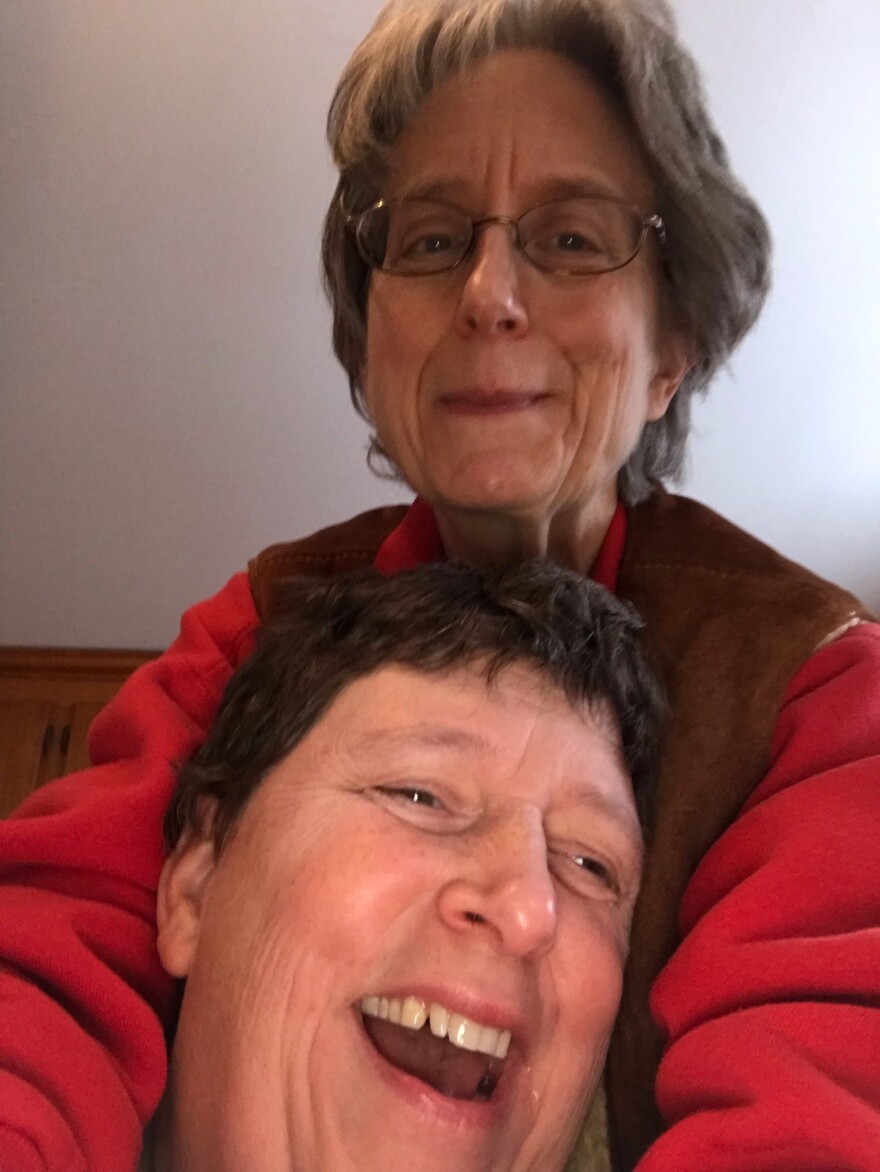The number of group homes for adults with developmental disabilities is dwindling in our area. And that leaves residents and their families with tough decisions to make. WMRA's Randi B. Hagi reports.
Sisters Linda Hanson, 62, and Carol Hanson, 55, are very close. One of the things Carol told me when we spoke earlier this month is that her sister is an organist at their church –
CAROL HANSON: And an awesome one at that.

To which Linda responded –
LINDA HANSON: Here's what I want you to know about my sister. She's creative, she has a lot of friends that she loves and who love her back.
Linda lives in Charlottesville. Carol moved in with her in 2003.
LINDA HANSON: Carol is an adult with cognitive, emotional, and physical disabilities. … so she needs help with meal preparation and making good decisions, and … keeping her behavior safe and respectful for herself and everybody else.
They lived together until 2017, but Linda said that arrangement, and the power dynamic inherent in it, was negatively affecting their relationship as sisters. So Carol moved into a group home. The first one they tried didn't work out, but in 2019, she got a spot in the Fontaine B home run by the Region Ten Community Services Board, or CSB.
CAROL HANSON: It was nice and big.
She had a desk with separate sections for art and office supplies, and made great friends with two of her housemates.
CAROL HANSON: Charlie and I – we had so much fun … Caroline and I really had the time of our life together.
But this year, Linda explained, the CSB had to close some of their homes due to a staffing crisis, and they needed to shift residents around. Carol would have to move – and the next closest home her case manager could find was in Lynchburg. Besides just a limited number of group homes being available, Carol also needed one that could accommodate her wheelchair.
And so, in late July, they moved her down to the Longwood Home in Lynchburg. It's run by Wall Residences, a company that operates group homes all over the state.
LINDA HANSON: The quality of services provided to people with disabilities is measured in part by how well we keep families together, and we're failing.
She noted that it's not the case managers' fault – they're trying to do the best they can with far too much on their plates. Region Ten CSB didn't respond to WMRA's interview requests.
An administrator with the Virginia Department of Behavioral Health and Developmental Services said that, in both the public and private sector –

HEATHER NORTON: … staffing shortages that were exacerbated by the pandemic have impacted our providers of residential services, that have caused some of them to have to condense homes that they have, and/or close some of their homes.
Heather Norton is the Assistant Commissioner for Developmental Services.
NORTON: So in some instances, it's shifting individuals, if you will, into open beds within their own system, and/or, for some providers, it may also be having to close some of those programs altogether.
She didn't have numbers on individual homes, but they do publish annual reports on providers – keep in mind that one provider could run multiple group homes. From October 2021 to April 2022, our region lost seven providers of small group homes, and three providers of homes with five beds or more.
Among other tactics, the department is responding to this housing shortage with requests for state funding that outside agencies could use to purchase homes and retrofit them, or build something new –
NORTON: … specifically for residential supports for individuals with more complex behavioral needs.
One of the ways that providers of both residential and day services get funding is through Developmental Disability, or DD, waivers. It's a complicated program, but at its core, a DD waiver means the state will pay for services needed by someone with developmental disabilities, which, for example, could be housing in a group home.
LINDA HANSON: They're scarcer than hens' teeth.

Carol Hanson's DD waiver covers her day program and her group home expenses. But a CSB-run facility isn't the only type of place she could live with that waiver.
LINDA HANSON: There is an option called sponsored residential placement. And that's roughly equivalent to foster care for adults with disabilities.
These are family homes that are regulated and supervised. Linda said that if more homes like that opened up, maybe Carol could move back to the Charlottesville area. Linda isn't the only loved one that Carol left behind. Their church is important, too…
CAROL HANSON: Kind of like an awesome, awesome family.
LINDA HANSON: Carol is the head usher of our little church, Wesley Memorial United Methodist Church. That congregation has been so loving and supportive … It's an extended family for us. She has many other friends in this community, and it takes a village to support someone like Carol.
Carol, now stuck in Lynchburg for the foreseeable future, spent nearly 20 years building that village in Charlottesville.


